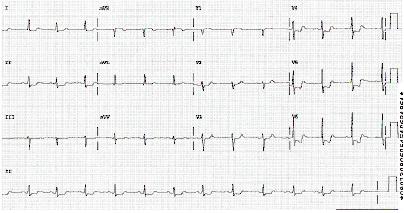Resumo
Definição
História e exame físico
Principais fatores diagnósticos
- dor torácica
- fatores de risco para doenças cardiovasculares
- sudorese acentuada
- choque cardiogênico
- insuficiência cardíaca aguda
Outros fatores diagnósticos
- náuseas e vômitos
- arritmias
- bulhas cardíacas anormais
- dor epigástrica
- dispneia
- síncope
- dorsalgia
Fatores de risco
- tabagismo
- hipertensão
- diabetes
- obesidade e fenótipo de síndrome metabólica
- comportamento sedentário e inatividade física
- dislipidemia
- doença renal crônica
- aterosclerose (história de angina, infarto do miocárdio, AVC, ataque isquêmico transitório, doença vascular periférica)
- história familiar de doença arterial coronariana prematura
- idade >60 anos
- uso de cocaína
- depressão
- trombose de stent ou reestenose
- apneia do sono
- procedimentos cirúrgicos (incluindo os períodos intraoperatório e pós-operatório)
- enxaqueca
- desfechos adversos da gestação
Investigações diagnósticas
Primeiras investigações a serem solicitadas
- eletrocardiograma (ECG)
- troponina de alta sensibilidade
- ecocardiografia
- radiografia torácica
- hemograma completo
- ureia, eletrólitos e creatinina
- testes da função hepática
- glicose sanguínea
- proteína C-reativa
Investigações a serem consideradas
- angiografia coronariana invasiva (ACI)
- lipídios
Algoritmo de tratamento
características de risco muito alto ou alto risco (IAMSSST suspeito ou confirmado)
sem características de alto risco (IAMSSST suspeito ou confirmado)
Pós-IAMSSST
Colaboradores
Consultores especialistas
Shrilla Banerjee, MD, FRCP
Consultant Interventional Cardiologist
East Surrey Hospital
Surrey and Sussex Healthcare NHS Trust
UK
Declarações
SB has received speaker fees for educational lectures (presentation content was her own) and meeting participation from Menarini, Edwards Lifesciences, Abbott Vascular, and Shockwave IVL. She has also participated in an Advisory Board for Sahajanand Medical Technologies Limited. SB has received travel sponsorship from Biosensors International to attend the PCR meeting in Paris in 2022. She has prepared a manuscript on coronary microvascular dysfunction for Abbott for Cardiovascular News (no royalties).
Adam Hartley, MBBS, BSc, MRCP
Wellcome Trust Clinical Research Fellow
Imperial College London
Specialist Registrar in Cardiology
Imperial College Healthcare NHS Trust
London
UK
Declarações
AH declares that he has no competing interests.
Acknowledgements
BMJ Best Practice would like to gratefully acknowledge the previous expert contributors, whose work has been retained in parts of the content:
Resham Baruah MBBS, BSc MRCP, PhD
Consultant Cardiologist
Chelsea and Westminster Hospital NHS Foundation Trust
Royal Brompton & Harefield NHS Foundation Trust
London
UK
Cody S Deen, MD
Assistant Professor of Medicine
Director of Cardiology
Hillsborough Hospital
University of North Carolina
Hillsborough
NC
Declarações
RB has received honoraria/speakers’ fees from Novartis and Boehringer Ingelheim. CSD was previously the Director of Cardiac Rehab for Chatham Hospital, which was financially set up as a consultancy relationship, until 2017. CSD has spoken (unpaid) at the Update in Cardiology and Update in Internal Medicine Conferences at UNC for the last 5 years. CSD has served as the PI for the Dal-GeneE (site now closed) and the ACCELERATE Trials at the University of North Carolina (trial now completed). Each trial required paid travel to an investigator meeting.
Revisores
Gavin Galasko, BM, BCh, MA, DM (Oxon), FRCP
Consultant Interventional Cardiologist
Director of Research, Development and Innovation
Blackpool Teaching Hospitals NHS Foundation Trust
Blackpool
UK
Declarações
GG declares that he has no competing interests.
Créditos aos pareceristas
Os tópicos do BMJ Best Practice são constantemente atualizados, seguindo os desenvolvimentos das evidências e das diretrizes. Os pareceristas aqui listados revisaram o conteúdo pelo menos uma vez durante a história do tópico.
Declarações
As afiliações e declarações dos pareceristas referem--se ao momento da revisão.
Referências
Principais artigos
Amsterdam EA, Wenger NK, Brindis RG, et al. 2014 AHA/ACC guideline for the management of patients with non-ST-elevation acute coronary syndromes: a report of the American College of Cardiology/American Heart Association Task Force on Practice Guidelines. J Am Coll Cardiol. 2014 Dec 23;64(24):e139-228.Texto completo Resumo
Byrne RA, Rossello X, Coughlan JJ, et al. 2023 ESC guidelines for the management of acute coronary syndromes. Eur Heart J. 2023 Oct 12;44(38):3720-826.Texto completo Resumo
National Institute for Health and Care Excellence. Acute coronary syndromes. Nov 2020 [internet publication].Texto completo
National Institute for Health and Care Excellence. Recent-onset chest pain of suspected cardiac origin: assessment and diagnosis. Nov 2016 [internet publication].Texto completo
Artigos de referência
Uma lista completa das fontes referenciadas neste tópico está disponível para os usuários com acesso total ao BMJ Best Practice.

Diagnósticos diferenciais
- Infarto do miocárdio com supradesnivelamento do segmento ST
- Angina instável
- Dissecção da aorta
Mais Diagnósticos diferenciaisDiretrizes
- ESC guidelines for the management of acute coronary syndromes
- Acute coronary syndromes
Mais DiretrizesCalculadoras
Escore GRACE para prognóstico de síndrome coronariana aguda
Escore do Thrombolysis in Myocardial Infarction (TIMI) para infarto do miocárdio sem supradesnivelamento do segmento ST com angina instável
Mais CalculadorasVideos
Como realizar uma demonstração animada do ECG
Mais vídeosFolhetos informativos para os pacientes
Insuficiência cardíaca: como posso me ajudar?
Insuficiência cardíaca
Mais Folhetos informativos para os pacientesConectar-se ou assinar para acessar todo o BMJ Best Practice
O uso deste conteúdo está sujeito ao nosso aviso legal